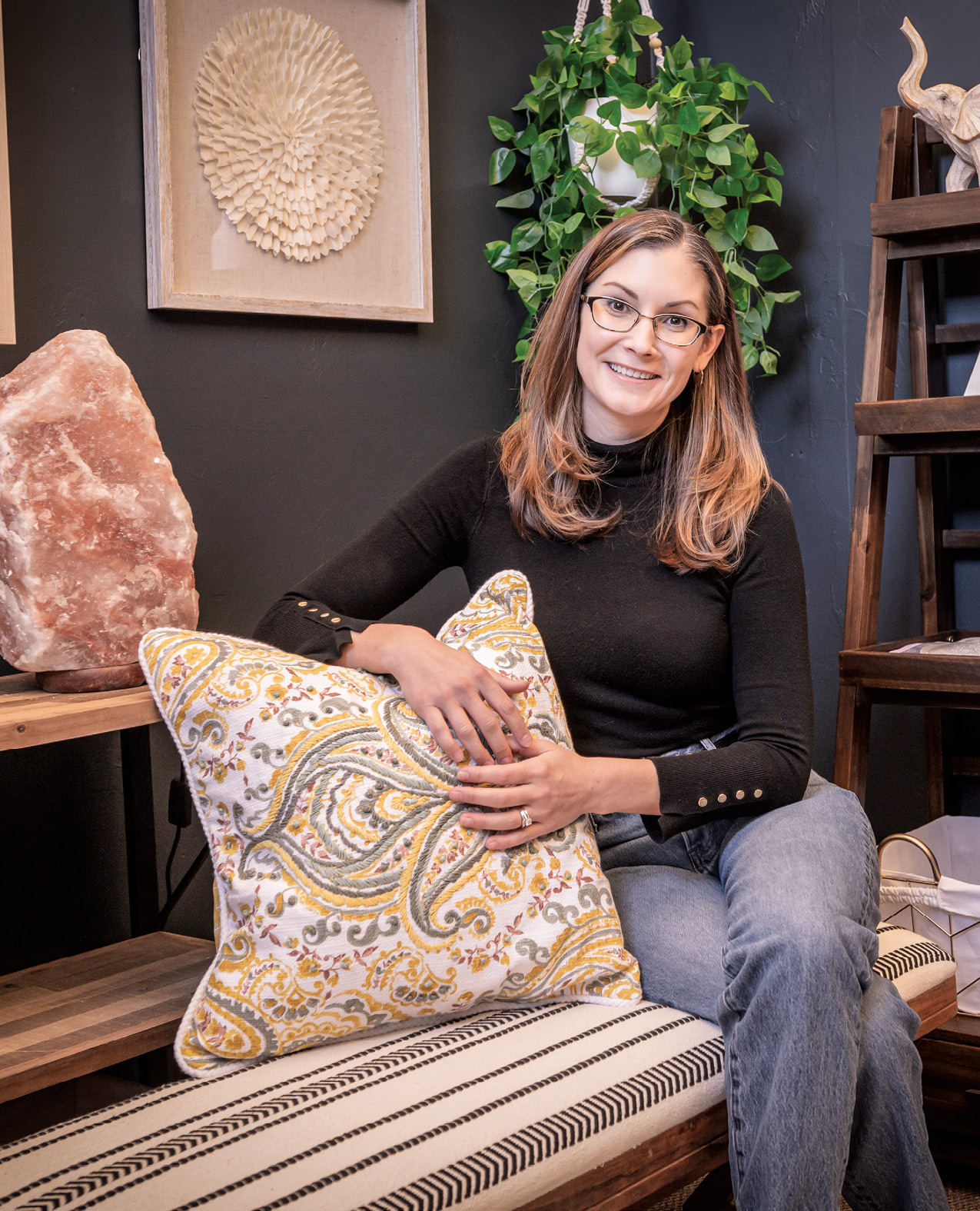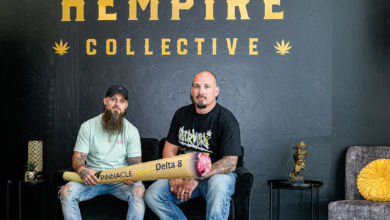
Although it stands for “anxiety & trauma treatment”, The ATT Center in Green Bay goes well beyond these two specialties. It is an all-encompassing therapy center, focusing on personalized and integrative treatments, and it’s just the beginning for this innovative team.
In the healthcare/caretaking field, burnout is practically inevitable due to circumstances such as long hours, stressed coworkers, and tough cases that weigh on a person. When Brittany Berkovitz, LPC, PATP, started The ATT Center in March of 2023 after many years of being in the industry, she knew she wanted a different approach.
“In some other practices, the burnout is real, and there’s just not a whole lot you can do about it, because the need is there,” says Brittany. “There’s so many people that need help, but I was wanting more support in helping us, too.”
Brittany’s vision was to create a therapy center that practices what it preaches, so she made her staff’s health a priority.
“It’s so important in every field, but I feel like for any kind of caretaker, it’s especially important,” she says. “So that was the idea with expanding the clinic.”
Some of the ways Brittany incorporates this into practice include in-house yoga, vitamin infusions, and weekly clinical staffing to offer support for one another. The ATT Center even has a peaceful and rejuvenating Zen room, where one can take a nap in the Bluetooth-equipped massage chair or simply take a mental health break from the workday.
“My idea here was to be able to really promote balance and well-being for my own staff,” says Brittany. “Because if we’re not doing well, that reflects on how we’re doing therapy with our clients.”
In addition to a healthy work-life balance for her staff, Brittany also knew she wanted to do things a little differently when it came to traditional therapy. One thing in particular was incorporating ketamine-assisted therapy (KAT), which is quite new to the area, but it has proven to be very successful in the therapy world.
“I wanted to be able to do my own thing for a medicine I truly believe in,” said Brittany. “So one way to be able to do that was to do it on my own and then find like-minded people who supported the vision as well.”
After completing the intensive course in psychedelic-assisted therapy, taught by industry leaders and research experts, Brittany knew this groundbreaking form of therapy could be the answer for some patients who are battling mental health issues.

An internal journey
The therapists at The ATT Center will first evaluate whether or not a patient is a good candidate for ketamine therapy. Brittany says ketamine therapy is typically helpful for those who have tried traditional medication and haven’t had success with it or those with treatment resistant depression. It can also help those with post traumatic stress disorder, suicidal ideations, obsessive compulsive disorder, anxiety, substance abuse disorder, and much more.
“Essentially, you’re using ketamine almost like a catalyst to easily access things that maybe aren’t so easy to access on their own if there’s blockages or significant trauma,” says Brittany. “It really helps to work on the default mode network, which kind of brings all your walls down and allows us to work with certain areas that maybe aren’t easily accessible.”
Brittany explains that many things need to be evaluated prior to administering the ketamine, such as discussing past traumas or addressing how the patient wants the therapist to support them in order to feel safe during the process.
“We do a lot of prep work to just prepare for the journey itself,” she says. “We want to talk about creating a safe container and how the therapist helps facilitate that.”
The treatment consists of three preparation sessions, six in-office two hour long medication sessions and three integration sessions over the course of three to six weeks.
Brittany explains it as “an internal journey”, so the clients wear headphones with music on that helps guide them, as well as a blindfold, if they prefer.
“We’re really wanting them to go inside of themselves, so we don’t want them to have a whole lot of external factors,” she says. “We want them to be open to exploring difficult things or sometimes pleasurable things, but whatever comes up in the journey, the hope is to move toward it instead of trying to fight it.”

Long-lasting, positive changes
Brittany shares that ketamine therapy is different for everyone with a very wide range of experiences. Some people have very minimal experiences, while others might revisit past memories or have full-blown psychedelic experiences, she explains.
“There’s so many different things that can pop up with it,” Brittany says. “So we want to talk about preparing for that but also don’t want to set any expectations, because the journey can be so different for every person each time they do it.”
Brittany says the medication and the journey are just a small piece of the process. In between the ketamine sessions, integration appointments are held where the therapist and client discuss what happened during the session. They address how to make sense of what occurred, how it can be applied to current life, and any insights that need to be further explored.
“This is how the medication can last long-term by getting people to start changing the way they’re thinking about life or any negative thought patterns,” says Brittany. “It’s very important to recognize that ketamine is just the vehicle, but the therapy is the part that really cements what’s going on and creates long-lasting, positive change.”
Exposure therapy: face your fears
Those struggling with specific anxieties or fears, such as spiders or being in a crowded place, can benefit immensely from exposure therapy.
“The whole idea with exposure therapy is to desensitize yourself and teach yourself that you can tolerate these levels of discomfort and can actually work through your fears,” says Brittany. “If there’s something that’s challenging or uncomfortable, it’s very easy to just try and avoid it, which kind of works in the short term, but what’s happening is we’re giving ourselves these messages that we’re not strong enough to handle situations.”
Brittany explains that this short-term avoidance is actually causing our self-confidence to take a hit and will cause our anxiety to get worse in the long run. Rather than avoid things that make you uncomfortable, exposure therapy attacks it head on.
“Eventually we become desensitized to the situation, and we’re also kind of proving our fear wrong,” says Brittany. “And then the cool thing that happens with that is our self-confidence goes up, so when a challenging situation arrives, the likelihood increases that we will actually move toward it and try to work through it.”

An all-encompassing therapy practice
The integrative team at The ATT Center works as a cohesive unit, but each member has their own specialties.
“I love that each of us has our little niche that we can offer,” says Brittany. “Craig works a lot with children, adolescents, and families, Autumn does a lot of sex therapy and is also taking the ketamine course, I do ketamine therapy and a lot of exposure work, and we just hired Noelle, a psychiatric mental health nurse practitioner, who is able to prescribe medication, which is very needed in this area right now.”
For traditional therapy, The ATT Center sees patients four years and older. Craig Linzmeier, LPC, says he works a lot with children who have anxiety, trauma, ADHD, and more.
“There seems to be a lot more pressure on kids these days, so my approach is if it’s anxiety, I do a lot of education about what a worry is and address some of their fears,” says Craig. “And then I try to lean into that stuff and work with the parents as well to help their children gain the confidence needed to work through those fears.”
Craig creates a safe space for children and families to feel comfortable sharing their struggles.
“Parents send me questions about the process, and I tell them it only takes one session to see we’re in the right direction,” he says. “Schools can only do so much, so therapy can be such a helpful outside resource.”
Another beneficial resource offered at The ATT Center is sex therapy with Autumn Schleis, LPC.
“There’s a lot of people coming through the door for sexual wellness, so it’s great to see them wanting to open up the conversation,” says Autumn. “I feel so honored to be that person for people and to see their relief when I tell them it’s not something to hide, suppress, or be ashamed of.”
Some of the topics addressed include sexual confusion, low libido, erectile dysfunction, sharing desires with a partner, and so much more.
“I believe sexual wellness is so integrated into our mental health, so there’s such a need for this,” says Autumn. “There’s so much shame and confusion around it, and I really just want to be a resource for the community.”
Upon hiring Noelle Muter, APNP, PMHNP-BC, in December, the center is now able to incorporate prescribed medication, which will help to better serve those in need.
As a psychiatric mental health nurse practitioner, Noelle says she typically deals with patients who are struggling with anxiety, depression, trauma, mood disorders, OCD, ADHD, and more.
“Even though they recognize there’s a mental health crisis in Wisconsin, there still isn’t enough access,” says Noelle. “This is another way to grant more access to care.”
The ATT Center also has many community collaborations to further benefit their patients’ health, such as yoga with Amy Wauters at Bay Area Yoga or IV and vitamin infusions with Melissa Allen at HYDROVITA Infusion Lounge.
For people who are interested in therapy but might be struggling to afford it due to insurance issues, The ATT Center also works with EAP (Employee Assistance Program). Being a newly expanded clinic, The ATT Center is happy to be able to offer new patient availability within two weeks.
No matter what your mental health struggles may be, the dedicated and knowledgeable team at The ATT Center is here to make you feel comfortable and give you the care you deserve.




